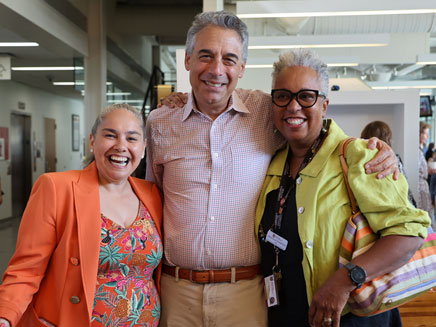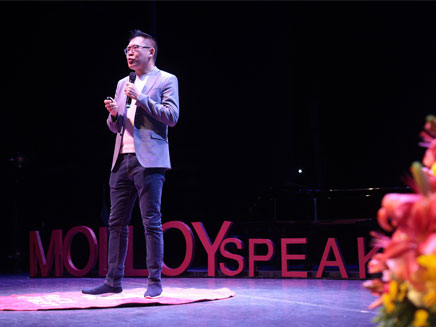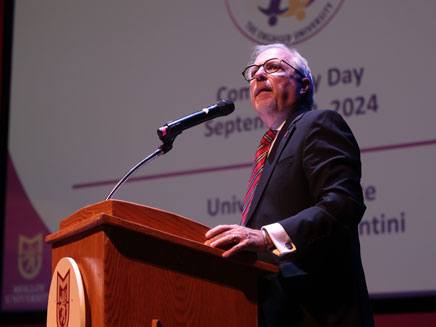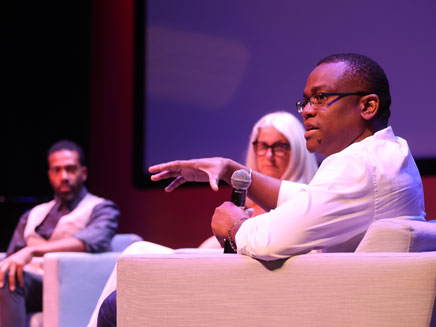September 13, 2024
Community Day 2024
 Molloy University faculty, staff and administrators gathered on September 3, 2024 for the annual Community Day events that mark the beginning of the academic year. In keeping with Molloy’s Catholic, Dominic faith tradition, Mass was celebrated in the University chapel, followed by a robust program in the Madison Theatre.
Molloy University faculty, staff and administrators gathered on September 3, 2024 for the annual Community Day events that mark the beginning of the academic year. In keeping with Molloy’s Catholic, Dominic faith tradition, Mass was celebrated in the University chapel, followed by a robust program in the Madison Theatre.
Video features, which were a highlight of the Community Day program, featured three student, faculty and administrator-created productions to present the Invocation, celebrate Community Engagement and explore New Student Orientation. Faculty members Michelle Rampal, PhD, Saxophone and Suk Hee Hong, Piano offered a musical welcome to their colleagues before Provost and Vice President for Academic Affairs Michelle Piskulich, PhD, who took the podium to set the tone for the morning’s program.
Faculty members took the stage to share their perspectives and experiences as engaged academics “living the mission” in their various fields of expertise. Starting with “Study,” Alexander Chan, PhD, Assistant Professor of Business, brought the audience through his career transition from the private sector to academia. Dr. Chan highlighted the importance of flexibility and learning, sharing the importance of taking a long-term view and honing your focus when presented with new information.
Moving on to “Spirituality” attendees went on a journey with Kimberly Engels, PhD, Associate Professor of Philosophy, whose research challenges the separation of traditional Western scientific analysis and the lived experiences of individuals who have reported experiences with perceived non-human intelligence. Dr. Engels is one of four researchers leading the “Archives of the Impossible” Metadata Project. Being open to transcending, without rejecting, received scientific research allows for multi-dimensional responses to spiritual, philosophical and otherworldly phenomena that individuals and groups experience. Dr. Engels emphasized the opportunity to draw on non-Western spiritual traditions in widening the lens through which we view physical and metaphysical events.
PhD, Associate Professor of Philosophy, whose research challenges the separation of traditional Western scientific analysis and the lived experiences of individuals who have reported experiences with perceived non-human intelligence. Dr. Engels is one of four researchers leading the “Archives of the Impossible” Metadata Project. Being open to transcending, without rejecting, received scientific research allows for multi-dimensional responses to spiritual, philosophical and otherworldly phenomena that individuals and groups experience. Dr. Engels emphasized the opportunity to draw on non-Western spiritual traditions in widening the lens through which we view physical and metaphysical events.
Exemplifying how a sabbatical year can be radically embedded in community work, Lisa Zakiya Newland, PhD, LCSW, Chair and Professor, Department of Social Work, shared what she called the “Sabbatical Year of Service.” Dr. Newland, who serves as Convener of The Black Family Summit (BFS), was able to expand the efforts of BFS in its core mission of supporting, healing, and uplifting the Black Community, rooted in the values of cooperation, collaboration, and collective work as reflected in the cultural traditions of people of African ancestry, by applying for and receiving a grant from the W.K. Kellogg Foundation. Dr. Newland encouraged participants to serve with clarity, authenticity, expertise, integrity and joy.
Highlighting “Community,” Mary McCormack, DNP, APRN, FNP-C, Associate Professor, Nursing shared the important work of the Molloy University Heart Safe Team. Posing the question, “What would you do?” in the context of an individual going into cardiac arrest, Dr. McCormack shared the sobering statistics that more than 350,000 people experience cardiac arrest in a non-clinical setting in the United States each year, with survival rates hovering at 10%. Providing appropriate training to community members is the critical link for survival, and Molloy University is leading the way with its Heart Safe Initiative. Focusing on “Call, Push, Shock,” faculty, staff and members of the Molloy National Student Nurses Association, along with more than 100 university and high school students, have made significant contributions to extending the lives of people in the community.
 The team has educated more than 1,100 laypersons on campus and in the Rockville Centre Community on hands only CPR/AED use, significantly increased the number of AEDs on campus and in Rockville Centre Community, created Cardiac Emergency Response Plan (CERP) for Molloy University and collaborating with Rockville Centre School district leaders and is lobbying in Albany and Washington D.C. for legislative changes to improve OHCA outcomes. Plans going forward include collaboration with Mother Cabrini Mobile Health Van to bring CPR/AED educational programs to vulnerable communities, replicating the Heart Safe Program being replicated at Dominican University in San Rafael, California and students and faculty nationwide, who plan to establish Heart Safe Teams in their own communities.
The team has educated more than 1,100 laypersons on campus and in the Rockville Centre Community on hands only CPR/AED use, significantly increased the number of AEDs on campus and in Rockville Centre Community, created Cardiac Emergency Response Plan (CERP) for Molloy University and collaborating with Rockville Centre School district leaders and is lobbying in Albany and Washington D.C. for legislative changes to improve OHCA outcomes. Plans going forward include collaboration with Mother Cabrini Mobile Health Van to bring CPR/AED educational programs to vulnerable communities, replicating the Heart Safe Program being replicated at Dominican University in San Rafael, California and students and faculty nationwide, who plan to establish Heart Safe Teams in their own communities.
Continuing the Community Engagement focus, Molloy University President James Lentini, DMA, introduced a panel that included Healthcare Workforce Development Project Coordinator Karim French, Hagan School of Nursing Faculty member Randy Pellew, DNP, FNP-C, CEN, and Jeannine Perrin, Administrative Assistant for the Rebecca Center for Music Therapy. Each participant discussed how their work engages Molloy students and employees with each other and the communities locally and internationally.
Dr. Lentini then took the podium to share the state of the University, stating that community engagement enriches scholarship, promotes research and creative activity, enhances curriculum, teaching and learning, prepares students to become engaged citizens, strengthens democratic values and responds to critical societal issues, and encourages civic responsibility to contribute to the public good. Molloy is currently seeking Carnegie Classification for Community Engagement – the Carnegie classifications are intended to support research and policy analysis and use empirical data about characteristics of students and faculty and the work of institutions to identify categories of institutions based on function and mission. Obtaining Carnegie classification has several positive outcomes, including recognition that we have actualized our university mission, self-study that allows the university to actively engage in data collection and continuous improvement, promoting assessment of community engagement from all stakeholders, insuring community engagement is curricular and cocurricular and encourages faculty teaching, service, and scholarship. The Carnegie classification also allows evidence for grants, state funding, and federal funding, and creates opportunities for revenue generation from recruitment and fundraising.
that community engagement enriches scholarship, promotes research and creative activity, enhances curriculum, teaching and learning, prepares students to become engaged citizens, strengthens democratic values and responds to critical societal issues, and encourages civic responsibility to contribute to the public good. Molloy is currently seeking Carnegie Classification for Community Engagement – the Carnegie classifications are intended to support research and policy analysis and use empirical data about characteristics of students and faculty and the work of institutions to identify categories of institutions based on function and mission. Obtaining Carnegie classification has several positive outcomes, including recognition that we have actualized our university mission, self-study that allows the university to actively engage in data collection and continuous improvement, promoting assessment of community engagement from all stakeholders, insuring community engagement is curricular and cocurricular and encourages faculty teaching, service, and scholarship. The Carnegie classification also allows evidence for grants, state funding, and federal funding, and creates opportunities for revenue generation from recruitment and fundraising.
Dr. Lentini reminded attendees that Molloy has been named a Hispanic Serving Institution, which means that more than 25% of the undergraduate population self-identifies as Hispanic and opens eligibility for grants from the U.S. Department of Education for student support services. Molloy continues to be proactive in supporting Hispanic students through community partnerships including 100 Hispanic Women and Ocean Financial, a Latino/a/e/x Affinity Group, Hispanic Heritage Month activities, student clubs and organizations and student support grants, including LSAMP, CSTEP, RESTORES, TRIO).
The stability and continued growth for Molloy is reflected in many ways, most significantly a steady increase over the past few years in welcoming first year students, record numbers of residential students, a significant waitlist for housing and the highest-ever attendance at summer new student orientation. Exciting initiatives in Academic Affairs included launching a new PhD in Communication Sciences and Disorders, 17 new or revised programs approved, five new workforce development programs through CEPS, more than 50 faculty members attending workshops on designing inclusive syllabi and the First Annual Multidisciplinary Undergraduate Research Conference. The Office of Advancement made great strides, particularly in private philanthropy, with a 6% increase over fiscal year 2023, increases in endowed scholarships, record fundraising at the annual golf outing and the establishment of an athletics booster organization, which has raised more than $100,000 for new fields.
Dr. Lentini closed the event by sharing his appreciation for everyone’s efforts, noting that the future is bright with everyone working together in the spirit of community, service, study and spirituality.